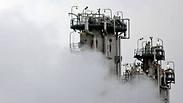
Arak heavy-water nuclear reactor
צילום: AP
France criticizes pace of work on Iran deal before July deadline
After IAEA says Islamic republic has begun cooperating with the UN watchdog, France slams 'slow progress' on
Iran is cooperating "too slowly" with a UN watchdog investigation into suspected nuclear weapons research, France said on Tuesday, warning that world powers will not seal any long-term deal with Tehran until there were tangible results.
The International Atomic Energy Agency said on Friday that Iran had cut its most sensitive nuclear stockpile by around 80 percent under an interim pact agreed in November with world powers and had begun engaging with the IAEA inquiry after years of stonewalling.
Iran's discussions with the IAEA are separate from its talks with the powers, but both are aimed at ensuring that it does not develop nuclear weapons, an intention it strongly denies.
"(The IAEA report) shows that Iran is respecting its commitments according to the Geneva agreement," French Foreign ministry spokesman Romain Nadal said, referring to last year's pact under which Tehran curbed parts of its nuclear program in exchange for some easing of sanctions battering its economy.
"That is indispensable for talks to reach a long-term agreement between the six and Iran," he said.
Related stories:
- UN report challenges Iran on ballistic missile program
- Ashton, Zarif to meet in Iran to discuss nuclear talks
- IAEA: Iran sharply cutting nuclear stockpile
The November accord was designed to buy time for talks on a final accord to end the decade-old nuclear dispute over Iranian nuclear activities that Tehran says are peaceful but the West fears may be aimed at developing a nuclear weapons capability.
Those talks began in February and are meant to hammer out an agreement by a self-imposed July 20 deadline.
However, Nadal said Iran's "cooperation with the IAEA on a possible military dimension (to its nuclear program) is progressing too slowly despite the agency's repeated efforts".
US officials say it is vital for Iran to answer IAEA questions if Washington and the five other powers are to reach a broader nuclear settlement. However, Tehran's repeated denials of any nuclear bomb aspirations will make it hard for it to admit to any wrongdoing in the past without losing face.
Paris has long held out for strict terms in talks, in which it and Britain, China, Germany, Russia and the United States are contemplating a further easing of economic sanctions if Iran can dispel their concerns.
"Concrete results (in the IAEA-Iran talks) are indispensable before the possible finalisation of a long-term agreement," Nadal said. "More needs to be done between now and July."
After years of confrontation with the West, the election last year of pragmatist Hassan Rouhani as new president paved the way for a thaw and a diplomatic breakthrough in November.
But the sides remain far apart on what a final settlement should look like, especially concerning Iran's capacity to refine uranium, which can have both civilian and military uses.
Underscoring the differences, senior Islamic Revolutionary Guards Corps commander Amir Ali Hajizadeh said on Monday Iran's missile program – which the West fears could help Tehran devise a deliverable nuclear weapon - would not be negotiated.
"Our defensive capabilities will not be negotiated; rather, Iran will improve its missile and defense technologies," he told the Islamic Republic's Arabic language Al-Alam television.










